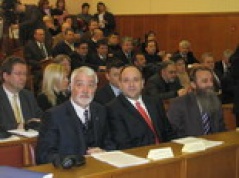National Assembly of the Republic of Serbia / Activities / Activity details

Monday, 13 March 2006
DONORS’ CONFERENCE TO FOSTER DEVELOPMENT OF FLOOD-STRICKEN REGIONS HELD
A Donors’ Conference to foster development of flood-stricken regions was held on 13 March at the National Assembly of the Republic of Serbia.
A Donors’ Conference to foster development of flood-stricken regions was held on 13 March at the National Assembly of the
Opening the Donors’ Conference, Mr Markovic underlined that the National Assembly, as the nation’s highest government body, needs to act as an intermediary between local authorities and ‘well-wishing’ international organisations, as no-one could ‘go it alone.’ He emphasised that this project, the result of hard work on the part of all – the United Nations Development Programme (UNDP), local authorities, the Government’s Poverty Reduction Team, civic associations – showed that we would all need to give meaning to the four symbols on the Serbian coat of arms (resembling four letters ‘s’ in the Cyrillic script): ‘The first ‘s’ is for stability; the second for solidarity, something very important for us to have today. I thank everybody who are ready for all of us to today get to know where and how we can help each other, as this is a form of self-respect, and proof of solidarity with those facing disasters’, Mr Markovic said.
Mr Labus reiterated that April would mark the first anniversary of the floods that devastated homes and roads and jeopardised lives of thousands of people. Thirteen million euros have been invested to compensate the damage, reconstruct homes and roads, and bring life in flood-stricken areas back to normal. The affected municipalities are still, however, poor; unemployment in these regions remains high. Projects to attract investment were needed to foster economic growth. Mr Labus expressed special thanks to the Poverty Reduction Strategy Implementation Team, the Poverty Reduction Committee and the Agriculture Committee, and the European Agency for Reconstruction (EAR) and UNDP, who helped in drafting the projects. The Government of the
Mr Parivodic greeted the attendees and said that images from the flood-affected areas showed the extent of the damage and indicated what needs to be done to help them. The Ministry organised visits to the areas for foreign diplomats, and conferred with other ministries, international organisations, and local authorities. The first step – solving pressing problems – has been taken; what needs to be done now is providing an economic basis for families affected by natural disasters and rebuilding infrastructure, Mr Parivodic concluded.
The chairperson of the Poverty Reduction Committee, Snezana Stojanovic-Plavsic, briefly introduced seventeen projects from the Secanj, Leskovac, Krusevac, Plandiste, Prokuplje, Zitoradja, Blace, Zitiste and Bela Crkva municipalities, most of which deal with agriculture, rural development, and village-based tourism. She underlined that only a joint effort by the National Assembly, the Government, the non-governmental sector and international organisations would make it possible to create a network to improve the quality of life of
Lance Clark, speaking on behalf of UNDP, expressed his gratitude for the holding of the Conference. Mr Clark underlined the importance of partnership for the process of providing support to flood-stricken areas, and thanked donors and project proposers for taking part in the Conference. UNDP, he added, had not only helped draft the projects, but would also work on monitoring project implementation and their evaluation.
At the end of the Conference, project proposers thanked for help provided with drafting the projects, and underlined that they needed to be implemented as soon as possible, as they mostly relate to agricultural issues and depend on the weather.

